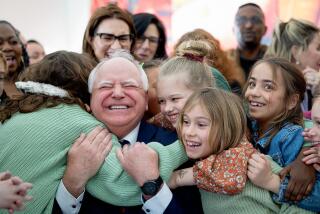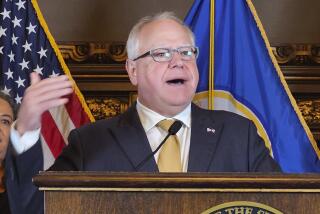Dole’s Big Question: Picking a Running Mate
- Share via
WASHINGTON — In early summer of 1968, I found myself pressing Richard M. Nixon to select Ronald Reagan as his running mate. Our campaign’s major problem was finding a way to dry up the vote for third-party candidate George C. Wallace. Selecting Reagan would have been the most effective way.
But I knew Nixon would never do it. In 1960, he had made Henry Cabot Lodge his running mate and suffered the indignity of having Time do a cover story on Lodge, not so delicately suggesting it was a horrible circumstance that the urbane Lodge was only No. 2 on the ticket. Time was unlikely to do the same for Reagan, but Reagan’s good looks and charm were obviously enough to disqualify him in Nixon’s eyes--even if he could solve our Wallace problem.
So, I pressed the case, hoping to keep attention focused on Wallace--a problem Nixon didn’t want to think about. When I finished, Nixon looked at me with as serious an expression as he could muster, given what he was about to say, and asked, “But would he be a good president?” Realizing this was one of the few times we weren’t going to have a serious discussion, I said, “I’m sorry. I thought you were going to be the president. I thought we were discussing who ought to be vice president.” He snorted, and we dropped the subject.
No presidential candidate expects to die in office, so none seriously considers what kind of president a vice president would be. Indeed, when vice-presidential candidates are chosen, the first consideration is whether they will help in winning. Those under consideration usually hold high political office and are, therefore, just as qualified to serve as president. Indeed, anyone Bob Dole selects is likely to have superior qualifications to those Bill Clinton had when he was elected president.
So we reach the question of who Dole should select as vice president. Obviously, if anyone could add substantial support for the ticket in California--a key state for the Democrats--the choice would be easy, but there is no such person. This doesn’t mean Dole should give up on California; whatever the polls show today, the state has a history of voting Republican in presidential races. In addition, a significant effort there would force the Democrats to commit resources they might better spend elsewhere.
Dole should carry Texas and Florida without any help. Bush carried both in 1992--even with Ross Perot drawing off considerable support. Judging from 1994 election results, the GOP is even stronger in those states now. Then, if Dole can hold the smaller states in the South and West, where the GOP is measurably stronger than its Democratic rivals, he would come into the election with a little more than 200 electoral votes, even without California. It only takes 270 to win.
Many people looking at this picture have focused on Gov. John Engler of Michigan as Dole’s best choice. Engler can talk authoritatively about welfare reform and the virtues of returning federal functions to the states, could probably deliver his own state and is a Catholic, which might help elsewhere, so the reasoning goes. But Engler might not give Dole enough help; if I were Dole, I’d look to another Midwestern governor.
Gov. George Voinovich of Ohio comes from a larger state, could reliably deliver it to the ticket and is also a Catholic. More important, Voinovich is an ethnic Catholic--his family immigrated from Serbia early in this century. Serbs are in bad odor, you may say, and, anyway, there aren’t enough to make a difference in a national election. Well, Catholic Serbs fled discrimination in Serbia from the predominant Russian Orthodox Church. In this country, they have always been accepted by their fellow Slavs--the Czechs, Croats, Poles, Lithuanians, Ukrainians, Slovenes and others--as fellow refugees from oppression. Indeed, Voinovich demonstrated he can draw support from a wide spectrum of Slavic voters when he won as mayor of Cleveland, and then as governor of Ohio.
And where, besides Ohio, do we find heavy concentrations of these voters? Places like Chicago, Detroit, Pittsburg, Buffalo and Gary, Ind.--places where steel mills have closed and there is little expectation that Clinton, Dole or Al Gore have any real knowledge of or sympathy for what becomes of the people.
Put together Ohio and Michigan, or Illinois, and the GOP can stop worrying about California. Add in the usually reliable Indiana, and a probable win in Missouri, and you’ve won--even if you lose in California.
I take Gen. Colin L. Powell at his word when he says he will not run as vice president. His proper place is in the Cabinet, and Dole should make it plain that Powell will be asked to serve in his.
Voinovich isn’t flashy, Time won’t be opining that it’s too bad he is only No. 2. And south of the Mason-Dixon line, they may not even be able to pronounce his name. But it’s possible he could secure the election for Dole and, at the same time, serve as a symbol for a segment of hard-working Americans who have never had the recognition they deserve.
Voinovich has been a popular governor. But if anyone wants to know what kind of president he would be, explain to them that Dole will be president--Voinovich is just going to hold his coat.*
More to Read
Get the L.A. Times Politics newsletter
Deeply reported insights into legislation, politics and policy from Sacramento, Washington and beyond. In your inbox twice per week.
You may occasionally receive promotional content from the Los Angeles Times.









